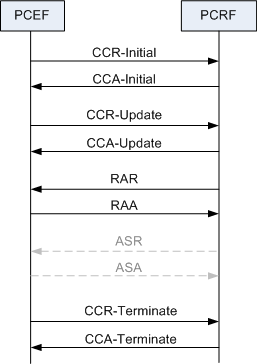Message Exchanging on the Gx Interface
Figure 1 shows the message exchanging process on the Gx interface.
Table 1 describes six messages exchanged over the Gx interface.
Name |
Direction |
Description |
|---|---|---|
CCR(Gx Message) |
PCEF -> PCRF |
The interworking between the PCEF and the PCRF involves three CCR messages: IP connectivity access network (IP-CAN) session authorization request, session modification message (including event notification), and session termination message. The PCEF sends CCR messages to indicate that a user is online or offline and to report quota. |
CCA(Gx Message) |
PCRF -> PCEF |
A Credit-Control-Answer (CCA) message is the response to a CCR message. The interworking between the PCEF and the PCRF involves three CCA messages, which are associated with three CCR messages accordingly. The PCRF manages a policy or returns a CCA message to the PCEF after the policy is released. CCA messages are responses to CCR messages that indicate whether a user is online or offline. |
RAR(Gx Message) |
PCRF -> PCEF |
The PCRF sends Re-Auth-Request (RAR) messages to the PCEF to modify, add, or delete value-added service policies. |
RAA(Gx Message) |
PCEF -> PCRF |
After updating a policy based on an RAR message from the PCRF, the PCEF returns a Re-Auth-Answer (RAA) message to the PCRF to inform the PCRF that the policy is updated. |
ASR(Optional)(Base Message) |
PCRF -> PCEF |
When the PCRF operates abnormally and must forcibly remove the policy on it, the PCRF sends an Abort-Session-Request (ASR) message to the PCEF. Upon receiving the ASR message, the PCEF returns an ASA message carrying a CCR-Terminate. The ASR message is an extended message. It is used when supported by the PCEF. |
ASA(Optional)(Base Message) |
PCEF -> PCRF |
An Abort-Session-Answer (ASA) message is the response to an ASR message. |

The NetEngine 8000 F receives but does not process *[AVP]. That is, the NetEngine 8000 F processes only the AVPs listed in this document and ignores other optional AVPs.
